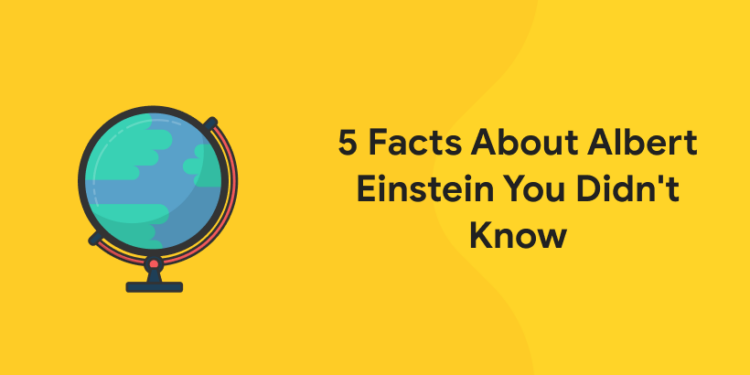Table of Contents
Einstein’s groundbreaking scientific ideas made his name a synonym for genius, but he was also famous for his pacifist views and support of the civil rights movement.
When people hear the word “genius”, Albert Einstein’s name often comes to mind. Among his most popular works is the theory of relativity, one of the main foundations of modern physics. He also famously developed the mass-energy equivalence or E=mc2, which is the most famous equation in the world. Albert Einstein’s numerous scientific breakthroughs had changed the way people see the universe and how it operates. 5 facts of Albert Einstein which you didn’t know is given below.
Download Entri App, to practice Mock Tests
Albert Einstein didn’t actually fail math
school kids have long taken solace in the claim that Einstein flunked math as a youth, but the records show that he was actually an exceptional, if not reluctant, student. He scored high grades during his school days, and was only frustrated by what he described as the “mechanical discipline” demanded by his teachers. There’s a popular urban legend that states that Albert Einstein failed math when he was young but eventually ended up being a brilliant scientist. Although it’s an inspiring story, it’s not a truthful one. He actually excelled in both math and physics at a young age, teaching himself more complex mathematics such as Euclidean geometry and algebra in the span of just one summer. At only 12 years old, Albert Einstein also discovered his own proof of the Pythagorean theorem and mastered calculus at the age of 14.
His brain was stolen for Research Purposes
1: Who was the first woman President of India?
It was a tough truth for the science world when Albert Einstein passed away in 1955. Scientists commemorated his life and his family mourned their own loss. But his family were shocked when they learned that, against his wishes, his brain had been stolen by Princeton pathologist Thomas Harvey. Although Einstein had requested to be cremated after his death, Harvey decided to remove the brain while performing the autopsy.
Harvey hoped that he would be able to study Einstein’s brain to see if there were any indicators of his genius hidden within the folds, but he could not find any definite proof. So, he then cut the brain into pieces and sent them to other scientists around the world to perform their own research. While it’s been suggested that his parietal lobe is more unusual than the average brain, nothing conclusive has ever been found.
Free UPSKILLING Courses!
Take your first step toward mastering in-demand skills, acing interviews, and securing top-tier jobs with Entri's free upskilling courses.
Start Learning!1905 was Einstein’s “miracle year”
The year 1905, when Einstein was just 26 years old, was a great year for Albert Einstein—it was his Annus Mirabilis or “miracle year”. In that year, he finished his thesis and received his Ph.D. from the University of Zürich. He also published four major works that would later revolutionize modern physics.
The Annus Mirabilis papers included his work on Brownian motion, special relativity, the photoelectric effect, and the mass-energy equivalence. All of these papers changed the way scientists view matter, space, and time. Perhaps one of the most shocking Albert Einstein facts is that he accomplished all of these when he was only 26 years old.
He was a civil rights activist
One of the most often-overlooked Albert Einstein facts was that he was a civil rights activist who fought against war and racism. As a Jewish scientist during the height of anti-Semitism in Germany, he was well aware of the injustices in society. He advocated for civil rights on countless occasions and empathized with the people who experienced discrimination, especially in the United States.
Einstein bore witness to the racial discrimination that was rampant in the US, particularly towards African Americans. In a speech he gave at Lincoln University, he called racism a “disease” and openly spoke out against it. He also endorsed a campaign in support of the Scottsboro Boys, nine teenagers in Alabama who faced false accusations and unjust trials because of racial discrimination.
Another testament to Albert Einstein’s advocacies was his friendly relations with African Americans. In 1937, the Nassau Inn in Princeton denied a room reservation to the black singer Marian Anderson because of her skin color. Einstein then welcomed her as a guest in his home and thus formed a lifelong friendship with her. He also used his fame to support the National Association for the Advancement of Colored People (NAACP) and its founder, W.E.B. Du Bois. When Du Bois faced trial for being a “foreign agent”, Einstein volunteered to appear as a character witness. Upon receiving word of this, the judge ultimately dropped the case because of the potential publicity.
Friendship with “the father of chemical warfare”
Fritz Haber was a German chemist who helped recruit Einstein to Berlin and would become one of Einstein’s close friends. Haber was Jewish but converted to Christianity, and preached the virtues of assimilation to Einstein before the Nazis came to power. In WWI, he developed a deadly chlorine gas, which was heavier than air and could flow down into the trenches to painfully asphyxiate soldiers by burning through their throats and lungs. Haber is sometimes referred to as the “father of chemical warfare.”
Download Entri App, to practice Mock Tests
Why is it important to choose Entri?
- Excellent online platform for all the Competitive Exams.
- Provides updated materials created by the Entri Experts.
- Entri provides a best platform with full- length mock tests including previous year question papers.
- You can download the app for free and join the required classes.
- Entri wishes you all the best for your examinations and future endeavors.
- Entri is always ready with answers to the questions you ask.
- Why waiting? Start your studies today. All the best.
“YOU DON’T HAVE TO BE GREAT TO START, BUT YOU HAVE TO START TO BE GREAT.”














